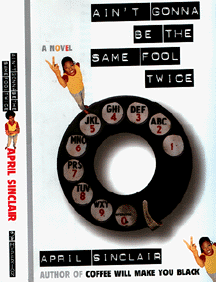

[ Metro | Metroactive Central | Archives ]
A Second Cup of Coffee for April Sinclair
Author Sinclair follows hit "Coffee Will Make You Black" with "Ain't Gonna Be the Same Twice"
By Nicky Baxter
April Sinclair's1994 debut novel, Coffee Will Make You Black, scorched the bestseller lists. Critics called Sinclair the new Terry McMillan, the reigning modestly talented queen of feminist spleen. And so, shoppers, let's compare. Both authors are of African descent. Both are female. Both write novels concerning women and womyn, and wimmen and mean, uh, men. So, there you have it: a gang of two hot properties. Conspiracy? Naw. Call it karma.
In truth, Chicago native Sinclair is a better writer than McMillan. And far funnier. Coffee is a coming-of-age story set in the Windy City during the civil-rights era. Jean "Stevie" Stevenson is a young "sistuh" born and raised on Chicago's black South Side. A smart kid who wants it both ways, she desperately desires to be down with the around-the-way boyz and girlz but is too singular to blend easily with any group. It's 1965, and integration's in. Her younger brother gets delirious every time he sees a black face on the Stevenson's bulky black-and-white TV set. Pops puffs up with pride at the very mention of Martin Luther King Jr. And Moms is a clerk--one of the few coloreds not pushing a broom in the banking industry. The Stevensons are eager to get upwardly mobile; Stevie's not so sure. Neither is she completely sold on the "girl's role" she's been handed.
Sinclair's new novel, Ain't Gonna Be the Same Fool Twice, picks up where Coffee left off. It's the early '70s, and black power has overcome civil rights only to be beaten down by the government. Having spent four years at a mostly European-American college somewhere in Illinois, Stevie's scooped up a degree in journalism and migrated to San Francisco's Castro District, where in her confused attempts at discovering herself, she falls in and out of love with a man-hating black lesbian (who, it turns out, despises black women as well), has an affair with a gay man's brother and generally tries to get by.
Sinclair's flair for the language of the times is uncanny, ditto her total recall of that era's style and substance. But Sinclair doesn't merely fax us black-and-white photocopies of a bygone era. Her remembrances are animated by prose at once eloquent and gritty. Describing her mother's increasingly distanced relationship with her father, she writes, "[Mama] often passed Daddy like a vegetarian walking past a steak house."
Like Coffee, her new novel is peppered with salty, sharp-tongued repartee. Pissed off at a party-line phone hog, Stevie's college buddy, Sharlinda, rants, "I have a constitutional right to use the mothafuckin' phone!" Stevie responds, "A constitutional right? The phone hadn't even been invented when the Constitution was written." Sharlinda rolls on: "The Constitution guarantees me the right to freedom of speech, goddamnit! These [white folk] are interfering with my right to speak. And I'm going to fight for my goddamn rights. Now, can I get a witness?"
With her sophomore novel, Sistah Sinclair, ought to collect herself a whole heap of witnesses.
[ Metro | Metroactive Central | Archives ]

April Sinclair talks about her work Saturday (April 27) at 7:30pm at Barnes & Noble, 3600 Stevens Creek Blvd., San Jose. (408/984-3495)
This page was designed and created by the Boulevards team.
Copyright © 1996 Metro Publishing and Virtual Valley, Inc.